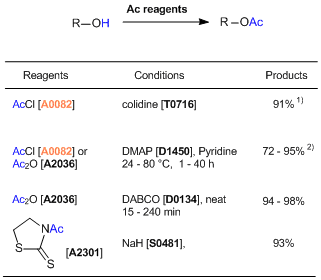Make sure to sign up for an account today for exclusive coupons and free shipping on orders over $75!
Maximum quantity allowed is 999
CAS RN: 75-36-5 | Product Number: A0082
Acetyl Chloride

Purity: >98.0%(GC)(T)
| Size | Unit Price | Philadelphia, PA | Portland, OR | Japan* | Quantity |
|---|---|---|---|---|---|
| 100G |
$44.00
|
17 | 26 | ≥100 |
|
| 500G |
$109.00
|
9 | 21 | ≥100 |
|
* Items in stock locally ship in 1-2 business days. Items from Japan stock are able to ship from a US warehouse within 2 weeks. Please contact TCI for lead times on items not in stock. Excludes regulated items and items that ship on ice.
* To send your quote request for bulk quantities, please click on the "Request Quote" button. Please note that we cannot offer bulk quantities for some products.
*TCI frequently reviews storage conditions to optimize them. Please note that the latest information on the storage temperature for the products is described on our website.
| Product Number | A0082 |
| Purity / Analysis Method | >98.0%(GC)(T) |
| Molecular Formula / Molecular Weight | C__2H__3ClO = 78.50 |
| Physical State (20 deg.C) | Liquid |
| Storage Temperature | Refrigerated (0-10°C) |
| Store Under Inert Gas | Store under inert gas |
| Condition to Avoid | Moisture Sensitive,Heat Sensitive |
| CAS RN | 75-36-5 |
| Reaxys Registry Number | 605303 |
| PubChem Substance ID | 87561779 |
| Merck Index (14) | 85 |
| Appearance | Colorless to Light yellow clear liquid |
| Purity(GC) | min. 98.0 % |
| Purity(Argentometric Titration) | min. 98.0 % |
| Melting Point | -112 °C |
| Boiling Point | 52 °C |
| Flash point | 5 °C |
| Specific Gravity (20/20) | 1.10 |
| Refractive Index | 1.39 |
| Solubility (miscible with) | Chloroform, Ether, Benzene |
| Solubility (soluble in) | Acetone |
| Pictogram |



|
| Signal Word | Danger |
| Hazard Statements | H302 : Harmful if swallowed. H314 : Causes severe skin burns and eye damage. H335 : May cause respiratory irritation. H412 : Harmful to aquatic life with long lasting effects. H225 : Highly flammable liquid and vapor. H290 : May be corrosive to metals. |
| Precautionary Statements | P501 : Dispose of contents/ container to an approved waste disposal plant. P261 : Avoid breathing dust/ fume/ gas/ mist/ vapors/ spray. P273 : Avoid release to the environment. P270 : Do not eat, drink or smoke when using this product. P240 : Ground/bond container and receiving equipment. P210 : Keep away from heat/sparks/open flames/hot surfaces. No smoking. P233 : Keep container tightly closed. P234 : Keep only in original container. P243 : Take precautionary measures against static discharge. P241 : Use explosion-proof electrical/ ventilating/ lighting/ equipment. P242 : Use only non-sparking tools. P271 : Use only outdoors or in a well-ventilated area. P264 : Wash skin thoroughly after handling. P280 : Wear protective gloves/ protective clothing/ eye protection/ face protection. P370 + P378 : In case of fire: Use dry sand, dry chemical or alcohol-resistant foam to extinguish. P390 : Absorb spillage to prevent material damage. P303 + P361 + P353 : IF ON SKIN (or hair): Take off immediately all contaminated clothing. Rinse skin with water/shower. P301 + P330 + P331 : IF SWALLOWED: Rinse mouth. Do NOT induce vomiting. P363 : Wash contaminated clothing before reuse. P301 + P312 + P330 : IF SWALLOWED: Call a POISON CENTER/doctor if you feel unwell. Rinse mouth. P304 + P340 + P310 : IF INHALED: Remove person to fresh air and keep comfortable for breathing. Immediately call a POISON CENTER/doctor. P305 + P351 + P338 + P310 : IF IN EYES: Rinse cautiously with water for several minutes. Remove contact lenses, if present and easy to do. Continue rinsing. Immediately call a POISON CENTER/doctor. P403 + P233 : Store in a well-ventilated place. Keep container tightly closed. P403 + P235 : Store in a well-ventilated place. Keep cool. P406 : Store in corrosive resistant container with a resistant inner liner. P405 : Store locked up. |
| RTECS# | AO6390000 |
| UN Number (DOT-AIR) | UN1717 |
| Class (DOT-AIR) | 3/8 |
| Packing Group (TCI-A) | II |
| HS Number | 2915.90.1890 |

References
- 1)Facile Catalyzed Acylation of Alcohols, Phenols, Amines and Thiols Based on ZrOCl2·8H2O and Acetyl Chloride in Solution and in Solvent-free Conditions
- 2)Protection for the Hydroxyl Group, Including 1,2- and 1,3-Diols
- P. G. M. Wuts, in Greene’s Protective Groups in Organic Synthesis, 5th ed., ed. by P. G. M. Wuts, John Wiley & Sons, Inc., Hoboken, New Jersey, 2014, Chap. 2, 17.

References
- 1)An Extremely Simple, Convenient, and Selective Method for Acetylating Primary Alcohols in the Presence of Secondary Alcohols
- 2)4-Dialkylaminopyridines as Highly Active Acylation Catalysts. [New synthetic method (25)]
- 3)Protection for the Hydroxyl Group, Including 1,2- and 1,3-Diols
- P. G. M. Wuts, in Greene’s Protective Groups in Organic Synthesis, 5th ed., ed. by P. G. M. Wuts, John Wiley & Sons, Inc., Hoboken, New Jersey, 2014, Chap. 2, 17.

References
- Protection for the Hydroxyl Group, Including 1,2- and 1,3-Diols
- P. G. M. Wuts, in Greene’s Protective Groups in Organic Synthesis, 5th ed., ed. by P. G. M. Wuts, John Wiley & Sons, Inc., Hoboken, New Jersey, 2014, Chap. 2, 17.
Articles/Brochures
Safety Data Sheet (SDS)
The requested SDS is not available.
Please Contact Us for more information.
Specifications
C of A & Other Certificates
Sample C of A
A sample C of A for this product is not available at this time.
Analytical Charts
The requested analytical chart is not available. Sorry for the inconvenience.





